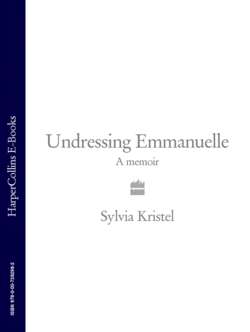Читать книгу Undressing Emmanuelle: A memoir - Sylvia Kristel - Страница 25
Оглавление21
My parents got divorced. That’s it, that’s what’s happened. Disunited, for life. It was my brave mother who officially told me. I am the oldest, entitled to responsibility, to scolding and to announcements, from the most trivial to the most serious. My parents have divorced. I am a neutral, one-way receptacle of news, of sharp wounds and of this announcement which has broken the thread of a life, devastated its shape and coherence.
We had been a scattered family, rather drunken, our bond one of industrious indifference and chaste, silent proximity. Work, introversion, the impossibility of really meeting and an incapacity for warm-heartedness had kept us at a distance from each other. We had been a family as bruised and divided as war veterans, but a family nonetheless.
My mother says that it doesn’t matter, that God will take care of us. God won’t do a thing, and neither will my mother. I see how hurt she is: she trembles all the time and her eyes shirk contact, blinking away her tears so they don’t fall. My mother wants to be strong and to keep thinking that she understands life, its organising principles. She clings to her rigid, protective framework but it is cracking, like an old sea wall that has been leaking for a long time.
My mother realises the power of love when he leaves. My father’s love, which she had thought hers, has settled on another woman, another body, and my mother is doubled up in pain and will be for the rest of her life.
My parents loved each other, I know that now. But they suffered from the same wound: their ability to love had been sealed over and undermined for years, since well before they met. Their love was boxed in. Sex was a separate thing, disassociated from love: a compulsive, substitute act for my father; remote, imposed and impossible for my mother.
My mother loved my father – his sudden fits of joy, his silence, his zest – but she refused his desire and his strength. She wanted a man’s tenderness only. Protestant traits were strong within her – a taste for limits and similarities, for smoothing people out, pushing away their desires and differences.
The difference was my father’s penis. My mother enjoyed their alikeness but not this big, hard penis, not my father’s sturdy body, his pungent smell, his weight on her, pressing down on her silky curves. My mother liked to dance, to whirl around gracefully, but she did not like to be shaken by the desire of a man.
My parents loved each other without saying so, avoiding each other to escape their love without being able to actually leave it behind. They did sometimes help and console each other, furtively and in secret. My father liked the way my mother took care of him. She dressed him, washed him, made sure that his cotton shirts were spotless and well ironed and that he was always served good food and cold beer. But good food was not enough. My father cheated on the wife who refused herself; he would go off but always come back, and she got used to these departures because there was always a return.
At night, my mental merry-go-round kept coming back to the same question. What is this thing that unites us all? The initial love from which everything follows? That was my question, and when I realised that I had no answer, no clue, when nothing that day had been tender or resembled love, then I would dream of somewhere else that was softer, of flying away, of a land where love would be the focal point of the day, of those films where everything is straightforward and always ends with a kiss so blissful it seems nothing could follow it.
I don’t know if there’s anything more violent than the refusal, the physical rejection of one’s own body by another person. The refusal of its skin, flesh, shape, existence. To be simply denied, held at a distance by a stiff hand or closed lips. That’s violent. For my father it was unbearable. It reminded him of being sent away, of boarding school, of his mother’s cold, dry hands. My parents were not able to say to each other what I am saying today. They were not able to understand each other, to see each other clearly, to join together love and the body. My parents’ love never hatched.
People either emerge from hurt stronger, or they drown. It depends on their nature, and also on luck. My parents drowned, though they pretended to carry on living. My father remarried, my mother never did. I think she waited for my father for the rest of her life, sitting in the living room watching television. I could see that my mother was waiting from the jumpy way she looked up whenever there was a knock at the door, the way her lips gasped apart each time the doorbell rang. The man would come back to her and she would welcome him, take him into her arms, into her body, she would do it for him. She would forgive him everything. She would have thought things through. She would keep loving him, and life without him – those years spent waiting – would have been a bubble, just a bubble that would burst and disappear as soon as my father came back.
I am a divorced child, of divided, uncertain background. Within this division I – supposed fruit of their love – no longer exist. I am sliced in two, separated, fragile. It happened almost forty years ago, yet to me nothing is sadder than my parents’ divorce.
